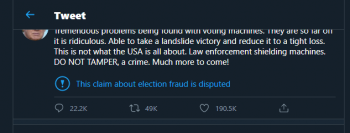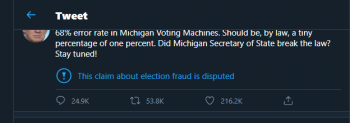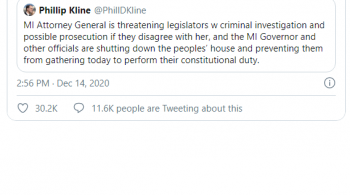I see no language that requires there be a session to appoint electors per the constitution. The GOP has a majority there, which should be enough.
I hope you can pardon my ignorance, but this is an education process for me reading different points.
From my reading electors are picked by each state as their individual state defines.
The original process was to allow each state to decide what there representation was going to be, but it appears in effect to be what the popular vote was in that state, where the electors for the winning party step forward.
I read one state does not do this for all electors and various congressional districts have a voter appointed separately for each district.
I know in the UK we do not have a constitution, and a lot of the procedures are based on precedence that went before.
This obviously leaves an interpretative gap, which I wonder if the 4 states involved have legislation that covers this.
Meet Pennsylvania’s Electoral College voters: Everything they can — and can’t — do
PA Law
Pennsylvania law says each presidential candidate picks their electors within 30 days of their party’s national convention and submits those names to the secretary of the commonwealth, Kathy Boockvar.
On Election Day, voters cast their votes for the electors to represent their candidate of choice — that’s why, when you cast your ballot, you selected “electors for” either Biden, Trump, or Libertarian Jo Jorgensen — and the electors are appointed based on whichever candidate got the most votes. In Pennsylvania, unofficial results show the 20 electors will go to Biden.
It appears Kathy Boockvar says who the electors are based on the popular vote, which is either republican or democrat.
If most of these things are anything to go by, until a court rules on what is acceptable and what is not, everything follows the current procedure.
So for republican electors to say they are the electors for PA, is a change from the existing procedure.
I am just commenting on what I can gather on quick searches but it is clear this process is not that clearly defined, because disputes to this level have not happened to need clearer definition.
In the UK we had a weird situation with trying to close parliament to get through a deadline without parliament being able to comment on it, which was within the rules but not the intent of our constitution. It had not been done before, and the courts overturned it, because its intent was not how the constitution ran, and there was no president, but rather the opposite. The courts opened up parliament, and reversed the legal process.
For us citizens who are actual bystanders of these historic moments, I find one learns so much about history and our origins by looking, asking and questioning. I suffer from the belief more referendums and direct involvement of the people and opinion would be helpful, and these kind of power conflicts easier to resolve, as well as forcing politicians to not leave important people in the community to be left behind. Trump and the Brexit vote highlighted a community divide where the political process has not been representing large groups fairly or their needs. I think isolationist responses never help, but rather better representation and opportunities to express things as well as real social change to be put on the agenda. History if full of revolutions when leaders failed to act.
God bless you






